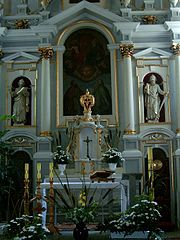
A History Of The Mass And Its Ceremonies In The Eastern And Western Church -Rev John O'Brien A.M.
THE BLESSED EUCHARIST BURIED WITH THE DEAD
So great was the faith of the primitive Christians in the virtue of the Holy Eucharist that, not content with giving it to the living, they also placed it in the grave with the dead, in order that it might be a safeguard against the wiles of the devil, and as a companion for that body which had been through life, in virtue of the participation of the sacraments of the Church, the temple of the Holy Ghost, as blessed Paul the Apostle says. But there were other reasons for this strange practice. Many believed, in simplicity of mind, that the Blessed Sacrament in this case would answer as a substitute for the last rites of the Church, should it happen that the person had died suddenly or otherwise unprepared.
It is generally said that a stop was put to this practice by a miracle which was witnessed at the grave of a person recently buried. The Blessed Sacrament, as the story goes, was interred with the corpse, but the moment the grave was covered the earth burst open, and after some time the coffin was exposed tot view. As no miracle was apprehended at first, the earth was gathered up and the grave made over anew; but the same thing happened again—the earth was scattered, as before, in all directions. This led to an examination as to the probable cause, and as it was found that the Blessed Sacrament sprang forth from the body of the deceased person, it was concluded that it was a portent of the displeasure of God. The custom, it is said, ceased from that time. (The reader must take our own statement of this story instead of better authority, as we find it impossible to recall the name of the work in which we read it.) Be this story true or false, the practice, as bordering on irreverence, was very early condemned, first by the third Council of Carthage, in A.D. 393, and afterwards by those of Auxerre, in France, and Trullo, at Constantinople.
In examining ancient customs we must be careful not to form hasty conclusions, and condemn our fathers in the faith for what may seem irreverent to us, but was never so intended by them.
Copyright ©1999-2023 Wildfire Fellowship, Inc all rights reserved

 Keep Site Running
Keep Site Running